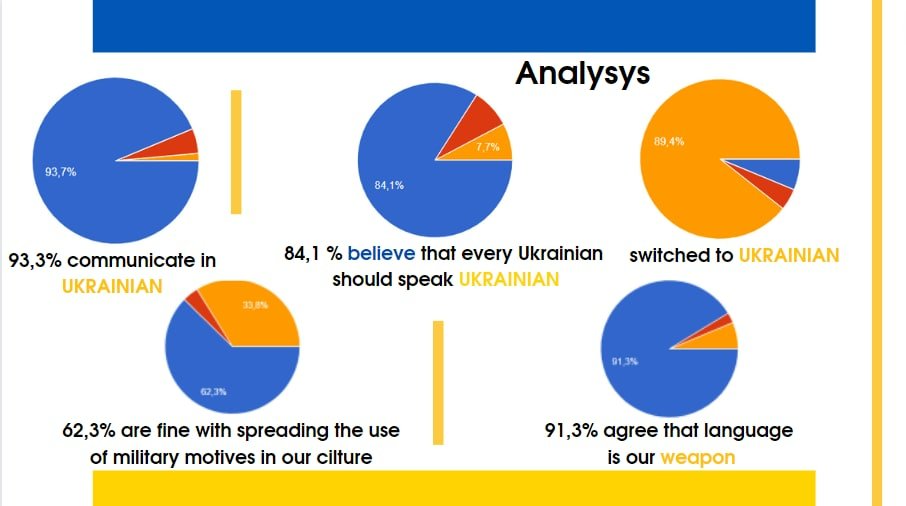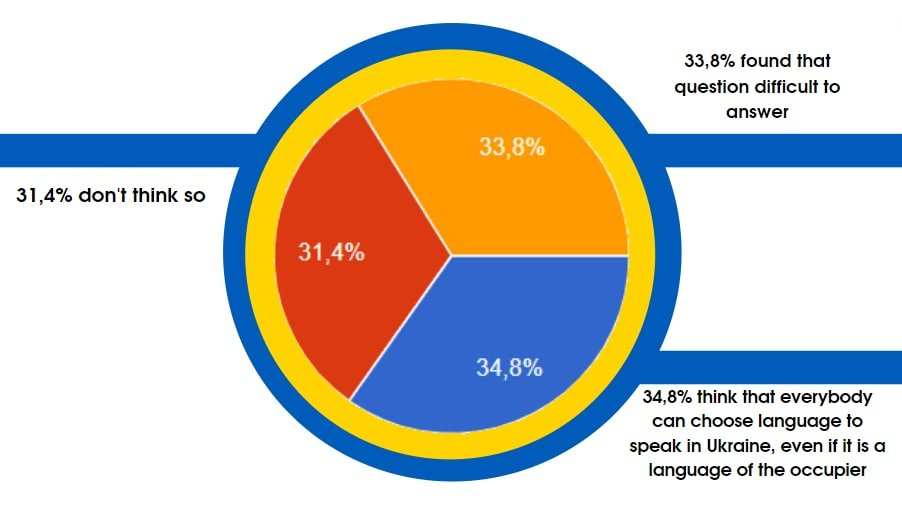The members of the Laboratory of Media Linguistics in Lesya Ukrainka Volyn National University have conducted research on the overwhelming influence of the War on the Ukrainian language and culture. The goal of the project was to study how the attitude to the use of the Ukrainian language is changing during the wartime and how people are reacting to this.
There were a lot of changes in the Ukrainian language throughout history. Language has traditionally been an important marker of Ukrainian identity which, due to the lack of independent statehood, has been ethnic rather than civic.
In the second half of the 19th and early 20th centuries, about 470 censorship orders were issued in the Russian Empire, the most notable were the Valuev Circular of 1863 and the Ems Ukaz of 1876. These decrees prohibited the publication of books in Ukrainian: first all except fiction, then all, including fiction and even musical notations. The Ems decree also prohibited the use of the Ukrainian language in schools, churches, journalism, newspapers, magazines, science, formal documents, translations, public speeches, theatre, etc.
The Government of the Soviet Union also wanted to suppress Ukrainian culture and nation. In the beginning, in 1923-1932, the period when Ukrainian rapidly developed and spread, they wanted to make the peoples of the union republics accept them as their friends, not invaders. Yet, in 1932 (the beginning of the Holodomor) the policy of Ukrainization began to be curtailed. Many philologists, writers, playwrights, directors, and scientists were imprisoned, sent to concentration camps, or executed.
Ukrainian culture lived in the hearts of millions of people, who urged to save and develop it even during extremely tough times. The large-scale russification decreased the impact of the Ukrainian language. In the late ’80s, at least 50% of Ukrainian educational establishments didn’t use the Ukrainian language in the process of study.
Fortunately, after Ukraine gained Independence, there has been a steady growth in the number of those who consider Ukrainian their mother tongue. Even though the Ukrainian language is strengthening, we still have to fight for our freedom, dignity and independence.
History is repeating itself and now we are facing the same threats. Occupiers destroy not only the city infrastructure but also a lot of historical and cultural monuments that withstood the Second World War. During the mass bombing of Kharkiv, the Writers’ Home ‘Slovo’ was badly damaged. As a result of the invasion, 25 unique works by Maria Pryimachenko were burned in the Museum of Local History in the town of Ivankiv, Kyiv region.
Language is a living entity that instantly reflects all changes in the society. Right now we can observe significant changes both within us and in our native language. For example, we have started writing proper names, which we treat with contempt, in lowercase. Furthermore, we started using the phrase “on russia” in response to their systematic avoidance of the orthographic norm “in Ukraine”. The preposition “on” implies denying the independence and sovereignty of the country and considers it only as part of a certain territory.
Moreover, the war has not only changed the spelling norms, but also contributed to the creation of neologisms such as putler and rashists.
A unique case is the usage of a famous phrase, which indicates the direction of the russian warship. This is an example of how a strong insult has become quite acceptable and widespread in a common language.
Quite a lot of words that have been coined recently enter a Ukrainian on-line dictionary. It includes humorous expressions formed from words or phrases popular during the war. For example, чорнобаїти (chornobayity) – to do the same thing all the time without getting another result and suffer because of it, арестовлення (аrestovlennya) – a reassuring message, затридні (zatrydni) – to set unrealistic plans and sincerely believe in their success.
Continued Russian aggression in Ukraine has prompted many English-language media outlets to switch from the outdated Soviet and Russian-derived spelling of “Kiev”, “Dnepr”, “Lvov” etc. to the Ukrainian Cyrillic-based spelling of “Kyiv”, “Dnipro” and “Lviv”.
What is more, the use of “the Ukraine” is officially deprecated by the Ukrainian government and many English language media publications. Ukraine is the official full name of the country, as stated in its Declaration of Independence and Constitution, so the use of the article “the” with Ukraine is incorrect both grammatically and politically.
After Russia started the War against Ukraine, Prime Minister of Great Britain Boris Johnson posted a video on his Twitter account where he started his speech in Ukrainian showing his great respect and support to the Ukrainian people who are fighting for freedom not only in Ukraine but in the whole world. “The people of the United Kingdom stand with our Ukrainian brothers and sisters in the face of this unjustifiable assault on your homeland”, said Boris in that video.
In addition, the President of the European Council Charles Michel has published a post in Ukrainian on his Twitter account. In it he wrote that he had a conversation with Volodymyr Zelensky and they discussed the strengthening consolidated support and concrete elements in ongoing negotiations between russia and Ukraine. One more interesting fact, Mr. Michel answered his followers’ comments in Ukrainian.
But politicians are not the only people who started speaking Ukrainian and just spread our language abroad. The Pope of Rome in his speech said “Glory to Jesus Christ” in Ukrainian to show all the believers his support and solidarity. He also added that he prays for peace in Ukraine every single day.
Our analysis is based on the results of the survey in which 207 people from different parts of Ukraine were interviewed and we want to express our gratitude for their participation. The average age among the respondents is 15-24, but we also have 13,5%(28) answers from people between 25 and 50 years old and 2,5%(5)respondents who are under 14.
Almost 94% of people speak Ukrainian in everyday life. And only 4,8% of the respondents have chosen Russian.
Although we have 17 people (8,2%) who stand their ground and disagree with the statement that everyone should speak Ukrainian within the country, 84,1% of the people who were questioned think that every Ukrainian citizen should speak their native language. 7,7% found that question difficult to answer.
87,4%(181) believe that Russia’s invasion into Ukraine affected the Ukrainian language and culture, helped to spread it and develop somehow. One example of it are new neologisms which people hope to use in the future.
According to our poll, 6,3%(13) of the surveyed people switched their language to Ukrainian since the beginning of the full-scale war. Almost 90% spoke Ukrainian before the invasion.
Never forget that Russia strives to clean out everything within the borders of Ukraine and ban the Ukrainian language. There is only one explanation for this – russia is afraid of a strong Ukrainian voice. 91% of people agree that occupiers simply fear the Ukrainian language by destroying Ukrainian books and culture.
62,3% (129) people accept the idea of spreading the use of military motives and themes in Ukrainian culture and 33,8%(70) find this question difficult to answer.
No one has stopped following the news since the beginning of the full-scale war. Sometimes TV presenters can curse or use the famous phrase about russian warship on live. We asked people their opinion of it and received different answers. Some people don’t care much about it, others think that this is inappropriate to curse on tv and a huge amount of people believe that the slogan has become the symbol of our resistance and they are waiting for this message to appear in history books.
The fact that many Ukrainians speak russian reflects the dramatic history of russification. We are facing the problem, it’s a mother tongue for lots of Ukrainians.
Can people choose which language to speak in Ukraine, even if it is the language of the occupier? For this question, we have received the most unexpected results because the respondents’ opinions were divided into three almost equal groups. 34.8% (72) of them agree with this statement while 31.4% (65) have the opposite point of view. 33.8% (70) of those who surveyed found this question difficult to answer.
Our attitude to russia, their people and especially to their language is completely different right now. We should reject all their propaganda attempts and remember what we are fighting for.
Now we can see the changes in culture and in the language. The whole world supports us. Supports the truth.
It’s a great time to protect Ukrainian culture, the spirit of our ancestors has raised in us and we have realized to the fullest that they sacrificed their lives for our freedom. We should remember who we are and we mustn’t speak the language that is used for the mass killing of our people. Let us remember that the Ukrainian language is our weapon. It’s a representative of people’s voice and as long as this voice is heard, the nation will live.
Glory to Ukraine and glory to its Heroes!
Group leader – Bohdana Mysanets
Topic consultants – Sophia Pastushyn
Google form designer – Sophia Mykhaliuk
Audience manager – Kateryna Steblyk
Group speakers – Veronika Popova, Sophia Prytoliuk,
Supervisors – Prof. Iryna Biskub, Senior Teacher Natalia Voloshynovych
Experimental research in Applied Linguistics


